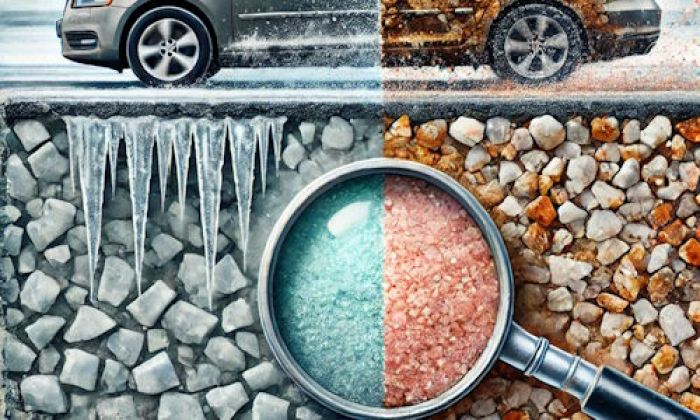Starting issues are the nightmare of every car owner. Each time it happens, you pray it's the last time. But sadly, this isn't always the case. On the contrary, the starting issues may worsen with time. And before you know it, your Ford won't budge an inch no matter how many times you try. The odds are your starter solenoid is acting up. But what can you do to fix these issues?
No-power problems highlights
- Level of urgency:high
- DIY inspection:possible but complicated
- DIY repairs:possible but often complicated
- Can you drive?no
- Price of repairs:$50 - $250
- If ignored:no-start, nothing works
- Ways to fix:check the battery, connections, fuses
.jpg)
Is a bad starter solenoid on your Ford a serious problem?
A starter solenoid (or relay) is an integral part of your Ford starter system. Starting your vehicle requires a lot of power. Since the engine doesn't produce any yet, your Ford draws this power from the starter.
A solenoid amplifies the electrical power coming from the battery, allowing the starter to set the engine into motion. At the same, it converts electromagnetic force into a mechanical one. This helps turn the engine's flywheel.
Because the starter solenoid affects only the initial starting of your engine, it won't technically impact your Ford's drivability. However, it may take you a while to start. In some cases, your vehicle won't start no matter how many times you try. Still, it won't affect your engine's performance and is thus rarely life-threatening.
4 common symptoms of a bad starter solenoid on your Ford
Your starter solenoid helps you start the engine. The most common symptom is thus related to frequent starting issues. The severity of such issues ranges from one case to another. In some cases, your Ford will refuse to start at all. But problematic starting is just the tip of the iceberg of your solenoid problems.
Here are 4 common symptoms you should look at for on your Ford:
1) Difficulties with starting your Ford
This is the most common symptom of a starter solenoid going bad. It can be a real pain in neck and is thus the main reason why you should replace a bad solenoid on your Ford as quickly as possible.
But before you condemn your solenoid as a worthless piece of junk, you should examine other possibilities. Starting issues can arise for many reasons. One of the most common ones is a bad battery. Without electricity, your starter motor won't be able to get the engine running even if the solenoid's intact. Make sure you check the state of your battery before you jump to any conclusions.
Assuming the battery is intact, your next task will be identifying what exactly when wrong with your solenoid. If faulty, the electromagnetic field won't generate enough mechanical force. A common reason for this is circuit issues or blown fuses.
Apart from total starting failure, a bad solenoid may simply make the starting process much slower than you're used to. Sometimes, you can also experience random stalling whilst you drive your Ford.
If any of this happens to you, consider examining the starter solenoid and the surrounding circuit. Simply fixing loose connections is sometimes enough to solve the issue altogether.
2) Your Ford emits a clicking sound when you try to start it
Odd clicking sounds are often a good warning sign of a failing solenoid. You can hear these sounds when you turn your Ford key into the 'start' position. This means your solenoid has enough power to spin, but not enough to engage the starter motor.
One of the main reasons this happens is insufficient power supply. Though this symptom can also accompany battery and circuit issues, it most commonly points to a bad starter solenoid. This is especially true if you also experience starting issues.
As far as fixing the issue is concerned, you should start by checking for a loose connection in the circuit. If you can't find any, you'll likely have to invest in a new starter solenoid.
3) You hear grating noises coming from the starter motor
Apart from mild clicking sounds, you may also hear rough, unpleasant noises coming from the starter motor. This happens when the solenoid doesn't operate the flywheel correctly. As the flywheel grinds against other parts, it creates unpleasant metallic noises.
You'll likely notice this symptom when you try to turn your engine on. In case of overheating, you may also notice a foul, burning smell coming from the starter motor. One of the most common reasons for overheating is high current. When a high current passes through the wires in the starter circuit, it overheats the metal. This issue only worsens with time. If you suspect this is happening to your Ford, have it checked by a mechanic as soon as possible.
4) Your starter motor doesn't shut down after you start the engine
The starter motor (and the solenoid) on your Ford have one job - to start the engine. Once the starter motor accomplishes this task, it's supposed to shut down. If it doesn't, your solenoid is likely going bad.
This often happens because of a dislocated plunger inside the starter motor. Because the current keeps flowing through the circuit, the starter motor won't disengage even once the engine starts running. It may also happen because of a faulty switch on your starter solenoid.
If you experience most or all these symptoms, you may have to replace the solenoid.
5 reasons why the starter solenoid on your Ford went bad
Now that you understand what the symptoms of a bad starter solenoid look like, it may be worthwhile to look at the causes. Remember, the starter solenoid on your Ford is part of an electrical circuit. Most of the associated issues are thus related to the circuit.
Here are the 5 reasons why the starter solenoid on your Ford is acting up:
1) You've had your Ford for quite a while
Few car components can resist the effects of high mileage. The starter solenoid is no exception. As the metallic components move, they generate a lot of friction. This friction eventually leads to damage.
The damage usually affects the plunger, a part that connects the starter motor to the battery. Without proper current, your Ford won't start as smoothly as it once used to. If you've had your Ford for several years, it's relatively normal to experience this issue. Before you take it to a mechanic, you should consider the pros and cons of owning such an old vehicle. Sometimes, buying a new one may be more economical in the long run.
2) Damaged circuit
The starter solenoid isn't always the main culprit behind starting issues. Chances are your circuit is damaged. If so, the solenoid will receive an inconsistent power supply. A low power supply means it won't be able to start your engine. And if it's too high, the voltage may cause the whole system to overheat and wear down.
This sometimes happens because of loose connections. In this case, fixing these connections is often enough to solve the issue. Just make sure you remove the battery while you work on the circuit issues. If you don't know how to do this, you should leave it to a professional mechanic.
3) Your starter solenoid keeps overheating
High temperatures can wreak havoc on many car parts, especially if they're made of metal. Metals expand with increasing heat. As they cool down, they shrink to their regular size. This can disrupt the connection between the solenoid and the battery terminals.
Excessive heat can also melt down wires, rendering the starter motor completely nonfunctional.
4) Your circuit is frequently exposed to moisture
Water and metal don't mix. The main reason why is rust formation. As moisture builds up on the wiring, it will lead to corrosion. Corroded wires and terminals don't conduct electricity well. As a result, your starter solenoid won't work properly.
If you live in a high-humidity area, your Ford may be more prone to this issue.
5) You overtightened some of the bolts
Although tightening the bolts around the starter solenoid is important, it's easy to get carried away. If you tighten them too much, you risk breaking or bending the metallic parts. This will affect the overall performance of the starter solenoid on your Ford, potentially leading to starting issues.
Fixing a faulty starter solenoid on your Ford
Unfortunately, fixing the starter solenoid on your Ford requires some mechanical know-how. If you've never tinkered with a vehicle before, you may be better off leaving it to a professional. These repairs cost around $300, including labor costs.
The solenoid itself ranges between $50 to $150. If you're feeling up to the task, you can try replacing it yourself. It should be located above the starter itself. Just make sure you disconnect the battery before you attempt any repairs. You'll also have to lift your Ford with jack stands.
Final thoughts on Ford Starter Solenoid Problems
The starter solenoid is an important part of your Ford starter motor. It powers up the engine once you turn the key. Without it, you wouldn't be able to drive your Ford.
That's precisely what happens when the solenoid goes bad. Apart from starting issues, you may also experience frequent stalling. But the problems don't end there. You'll also hear clicking and grinding noises coming from the starter.
Your starter solenoid will naturally go bad with age. As you rack up the miles on your Ford, the metallic parts will wear down. But if it happens on a new model, it may be due to a faulty circuit. Without a proper connection, the solenoid won't receive enough power to function. High humidity leads to corrosion, which has similar effects on its performance. Other common causes of solenoid issues include high temperatures and overtightened bolts.
Fixing the issue requires some mechanical knowledge. Without it, you won't be able to replace this part. To avoid making the issue even worse, you should have it replaced by a professional mechanic. The repairs will likely cost you around $300, though the exact price may vary based on your location and Ford model.
About the authors
The CarAraC research team is composed of seasoned auto mechanics and automotive industry professionals, including individuals with advanced degrees and certifications in their field. Our team members boast prestigious credentials, reflecting their extensive knowledge and skills. These qualifications include: IMI: Institute of the Motor Industry, ASE-Certified Master Automobile Technicians; Coventry University, Graduate of MA in Automotive Journalism; Politecnico di Torino, Italy, MS Automotive Engineering; Ss. Cyril and Methodius University in Skopje, Mechanical University in Skopje; TOC Automotive College; DHA Suffa University, Department of Mechanical Engineering





Add comment